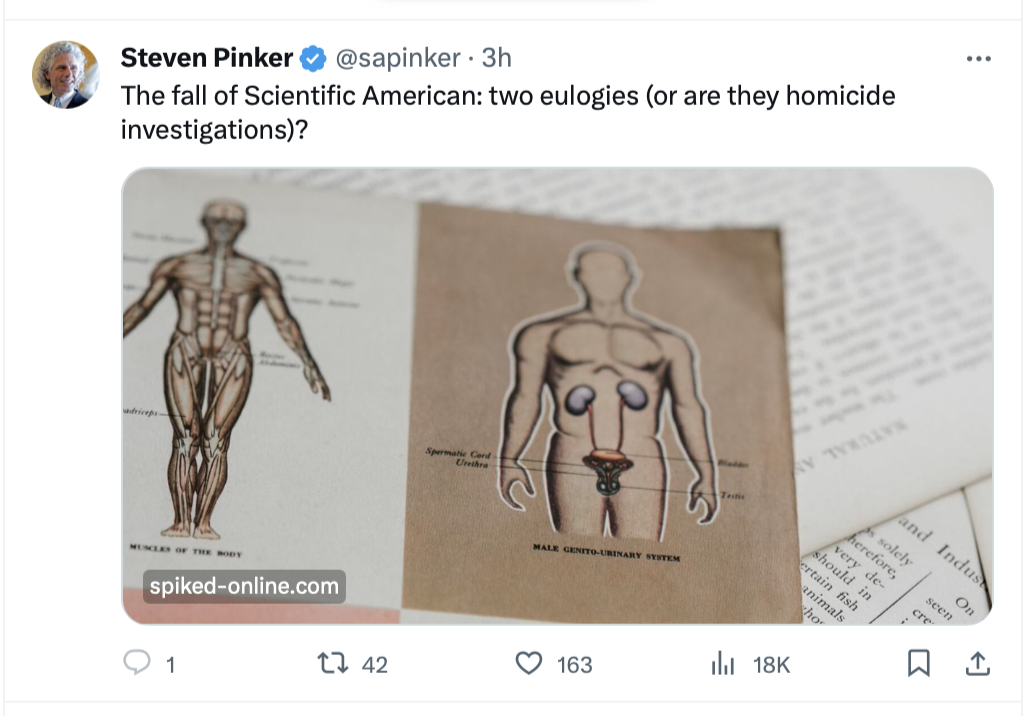Two Views on Gender Ideology
I suspect that these tweets by J.K. Rowling and Billboard Chris are mostly entire compatible. And I do think the first and worst mistake we made as a society is allowing a decoupling of sex and gender. First, Billboard Chris:
There are two sexes, zero genders, and infinite personalities.The word ‘gender’ was fine as a synonym for sex when those of us over the age of 30 were growing up. It’s not anymore. Use the word ‘sex.’
The word ‘transphobic’, as used here, does not mean an irrational fear or dislike of trans people. It means refusing to use gender identity ideology’s jargon, refusing to parrot its slogans, refusing to accept that sex doesn't matter when it comes to sport and single-sex spaces, refusing to believe a bearded heterosexual man becomes a lesbian when he declares himself one, and refusing to believe an abusive, misogynistic male is a woman because he likes to wear mini-dresses and pout in selfies.Like every other gender critical person I know, I believe everyone should be free to express themselves however they wish, dress however they please, call themselves whatever they want, sleep with any consenting adult who wishes to sleep with them, and that trans-identified people should have the same protections regarding employment, housing, freedom of speech and personal safety every other citizen is entitled to.
But this isn’t nearly enough for the dominant strain of trans activism, which asserts that unless freedom of speech is removed from dissenters, unless trans-identified men are permitted to strip away women’s rights, with particular reference to single sex spaces like rape crisis centres, prison cells, hospital wards, changing rooms and public bathrooms, until we all bow down to their neo-religion, accept their pseudo-scientific claims and embrace their circular reasoning, trans people are more oppressed, and more at risk, than any other group in society.
This is nonsense. 99.9% of the world knows it's nonsense. The emperor is naked. He might be wearing lipstick, but his balls are swinging in plain sight.
Also consider the following excerpt from J.K. Rowling’s new book, The Women Who Wouldn’t Wheesht:
The thing is, those appalled by my position often fail to grasp how truly despicable I find theirs. I’ve watched “no debate” become the slogan of those who once posed as defenders of free speech. I’ve witnessed supposedly progressive men arguing that women don’t exist as an observable biological class and don’t deserve biology-based rights. I’ve listened as certain female celebrities insist that there isn’t the slightest risk to women and girls in allowing any man who self-identifies as a woman to enter single-sex spaces reserved for women, including changing rooms, bathrooms or rape shelters. . . . I’ve asked people who consider themselves socialists and egalitarians what might be the practical consequences of erasing easily understood words like “woman” and “mother”, and replacing them with “cervix-haver”, “menstruator” and “birthing parent”, especially for those for whom English is a second language, or women whose understanding of their own bodies is limited. They seem confused and irritated by this question. Better that a hundred women who aren’t up to speed with the latest gender jargon miss public health information than that one trans-identified individual feels invalidated, seems to be the view.…



